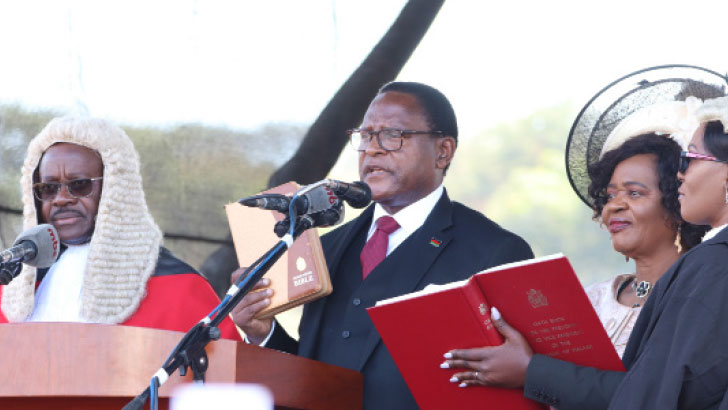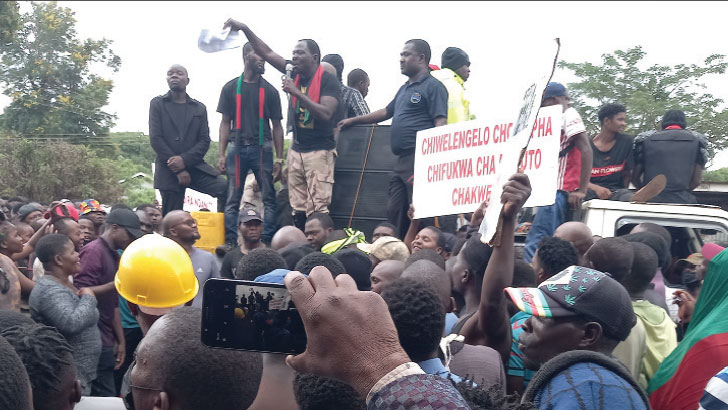Tonse Alliance administration in the eyes of CHRR
As the year ends, people have different views on how the Tonse Alliance government has performed. EDWIN NYIRONGO talks to Centre for Human Rights and Rehabilitation (CHRR) executive director Michael Kaiyatsa who shares his assessment of the same. Excerpts:

Q :What is your take on Tonse Alliance administration’s performance in the year just-ended?
A:With any political administration, there are myriad ways that their performance can be assessed. Fortunately, President Lazarus Chakwera already set factors for assessing his administration.
In his inaugural address on July 6 2020, he talked about improving governance, fighting corruption, uniting the country and achieving economic prosperity. However, in the year just-ended, his administration has not achieved most of the set goals.
While there have been some gains, suspicious happenings such as the ones at the National Oil Company of Malawi (Nocma) on procurement of fuel reflect poor governance, mismanagement and pervasive corruption, which have threatened the realisation of the ‘new Malawi’ we were promised.

Almost two years after being ushered into office, the administration’s goal of uniting the nation remains elusive. Chakwera presides over a Malawi society fraught with divisions. Tensions that initially divided the nation after the June 23 2020 court-sanctioned fresh presidential election still persist.
A key part of the Tonse administration’s aim of uniting the country was to level up the regions by spreading development projects and economic opportunities. This was largely understood to mean ensuring that every region gets a fair share of the country’s resources. So far, this virtuous aim has not been achieved.

The Tonse administration’s response to the Covid-19 crisis has also revealed the fragility of its governance muscle. Any government is bound to make mistakes and errors of judgment during an unprecedented public health crisis, but some of the Tonse Alliance administration’s failings, including its failure to properly hold to account controlling officers alleged to have misused Covid-19 funds, are due to sheer incompetence.
Q:What about on human rights?
A: Malawians have in the past year suffered multiple breaches of their civil, political, economic and social rights.
Under the watch of the Tonse Alliance administration, many have been pushed back into poverty largely due to its confiscatory tax policies and failure to rein in rising inflation. Some cannot afford to feed themselves any more.
The right to health has also suffered multiple breaches in 2021, with health centres across the country reporting serious shortages of drugs, basic equipment and medical supplies thus causing many preventable deaths and worsening inequalities, especially for the poor, who solely rely on public health facilities.
Even essential supplies such as anaesthetics were unavailable in many district hospitals, thus affecting health, and putting the lives of expectant mothers at risk. As of November 2021, almost half of Malawi’s district hospitals had closed their operating theatres due to a dire shortage of anaesthetics and other drugs, according to the Anaesthesia Association of Malawi.
The year just-ended also saw a resurgence in attacks against persons with albinism, with at least three deaths recorded since January. This, coupled with a rise in attacks and killings of people accused of witchcraft, has reflected badly on the administration’s promise to ensure the protection of the most vulnerable people.
In September last year, the Tonse administration won praise for operationalising the Access to Information (ATI) Act. However, that significant milestone has been undermined by continued failure by authorities to fully comply with obligations under the ATI Act. An observation has consistently been made by the media, civil society and the academia that withholding of public information is still part of standard procedure in many government ministries, departments and agencies. There are numerous instances in which Malawians have been denied access to public information by authorities. A clear example is the Public Sector Systems Review report, which has still not been released to the public despite calls to do so.
Q : The economy?
A: It did not suffer frequent blackouts as was the case during the previous administration. Water shortages have also lessened.
However, the economy has faced other setbacks, notably inflationary pressures arising from increasing prices of strategic commodities such as fertiliser and fuel on the global market, coupled with a volatile exchange rate and depleted foreign exchange reserves.
With a rapidly devaluing currency and a soaring inflation, many Malawians have haplessly watched their earnings evaporate. Some have found that they cannot afford to feed themselves any more.
The Tonse administration has previously been criticised for being too slow in responding to issues. This analysis rings true when one considers how long it has taken for it to come up with a social economic recovery plan to rescue citizens from the serious economic hardships they are facing.
During his inaugural address last year, the President promised Malawians that his administration would accomplish the goal of economic liberation, a goal, he said, had been elusive for the past 26 years.
He further said Malawi’s poverty is man-made, which means it can be unmade. But in the past year, so little was noted towards “unmaking” Malawi’s poverty. In fact, most of the economic challenges Malawians are facing now are man-made, arising not out of natural causes or the Covid-19 pandemic [as is often the excuse], but out of punitive and oppressive man-made economic policies designed to squeeze people’s hard-earned income in the name of increasing tax revenue.
Q:Some people have been demonstrating against tough life. Was there any justification in the wake of Covid-19?
A:Demonstrations are a constitutional right. Section 38 of the Constitution of the Republic of Malawi states clearly that “every person shall have the right to assemble and demonstrate with others peacefully and unarmed”.
Of course, the right to demonstrate is not absolute; it can be limited. However, international human rights law makes clear that while limitations on rights are permissible during a health emergency, these limitations have to be necessary, proportionate, non-discriminatory and in place for a limited period of time. In our case, you will note that most of the demonstrations have happened during periods when restrictions on public gatherings have been relaxed. This means that they were justified from a human rights and health perspective.
It is also important to note that such demonstrations have not only happened in Malawi. Protests over responses to the pandemic and economic hardships have been recorded across the world. Data compiled by the Civicus Monitor finds that Covid-19-related protests were staged in at least 86 countries from February 2020 to January 2021.
Q : What do you say to claims that the civil society only rushes to point out government failures, but ignores success stories?
A: It is true that we are often seen as focusing on government’s failures. But our interest is not to denigrate or vilify governments, but to ensure that governments are doing the right things and addressing their failures.
As CSOs, we consider ourselves as ‘critical friends and partners’ that can help governments deliver on their mandates. A good friend is not the one who tells you only what you want to hear, but the one that points out your failures, so that you can work on them and improve.
Q: We have seen prominent figures being arrested for corruption and theft. Do you think this is enough in the fight against vice?
A:The arrest of prominent figures for corruption and theft is a good development. However, arrests are not an end in themselves. Police make dozens of arrests each year, but that does not mean they are solving crime.
I believe that what Malawians want to see is a situation where those arrested are promptly brought to trial and, if found guilty, punished in accordance with our laws. Unfortunately, in Malawi, arrests of prominent figures are made, but very few make it to trial. Currently, we have a number of high-profile corruption cases, some dating as far back as 2004, which are still gathering dust in the courts. If we are serious about fighting corruption, we need to prioritise prosecution of cases.
Q: How do you rate the performance of the opposition?
A: Frankly speaking, our opposition has been on a death bed since the day the Tonse Alliance was ushered into power last year.
After their loss in the fresh presidential election, we had expected major political parties such as the Democratic Progressive Party (DPP) and the United Democratic Front (UDF) to form a formidable force to provide adequate checks and balances to the new government. However, these parties have not matched up against that expectation, largely due to internal leadership wrangles and a general lack of intra-party democracy.
The DPP, which is supposed to lead the opposition, is busy solving divisions within itself. So, literally, we do not have opposition at the moment.
Q: What do you want to see in 2022?
A: As an organisation, we would like to see the Tonse Alliance administration doing more to deliver its electoral promises. We would also like to see a united, strong, committed, credible and responsible opposition. Such an opposition is badly needed, especially now that the Tonse administration is showing signs of reneging on its campaign promises.
We want to see a strong and effective opposition to ensure that the Tonse government does not abuse its mandate and starts neglecting the interests of Malawians.
We urge opposition parties to help Malawians by holding to account the Tonse Alliance administration on its election promises, which include fighting corruption, improving social service delivery, tearing down tribal and regional walls, reducing poverty and improving people’s living standards. We urge the DPP national governing council (NGC) to meet urgently and elect a new leader to replace Peter Mutharika, who, we understand, wants to lead a private life. We also urge the UDF to recollect itself and start effectively playing its role as an opposition party.





